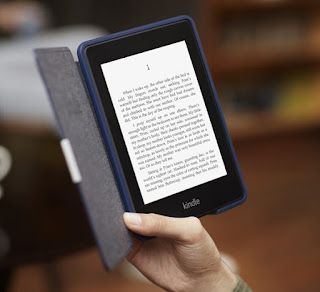My views on the new Kindle Paperwhite
 |
| Image from Redmondpie: http://goo.gl/Arfa5 |
Today Amazon announced a range of new products which all frankly look pretty amazing, both for ebook readers and general consumers of digital content. I’m starting to get the impression towards the end of 2012 that a number of computing platforms are starting to mature all at once. The recently announced Nokia Lumia 920 includes wireless charging, NFC, a massive battery, and a screen you can use with gloves on (which also works in strong direct sunlight). Tablet computers are finally becoming so mainstream that it now seems inevitable they will replace old fashioned computers for many users. And finally, the humble ereader gets some of the attention too.
The Kindle Paperwhite has solved many of the issues the previous Kindle generation suffered from. The new high-contrast screen, with crisp text, capacative touch, and frontlit illumination–while maintaining eight weeks of battery life–make it a very attractive proposition indeed and will inevitably bring ebooks to more people. The Kindle 4 has also been given a new paintjob and dropped in price to the ridiculously low level of $69 (it remains to be seen what that will translate to in the UK). In short, the ereader is coming of age and until we see colour e-ink screens with refresh rates and resolutions as good as today’s tablet displays, I can’t really think of any further major advances that would improve the platform further (apart from NFC and wireless charging, perhaps…!)
Part of me is tempted to buy a new Kindle Paperwhite. However, I’m wary of being lured into the same cycle of “buy–new model is released almost immediately–upgrade” that has saturated the smartphone world. The concept of the upgrade leaves consumers dissatisfied with a smartphone they thought was cutting edge only months before. In my day job I see it every day: gadget envy of the newest and shiniest, without stopping to think about what they actually need.
While the pace of technological change has the potential to bring true benefits into our lives when it comes to smartphones and other computing instruments, I still have a hard time thinking of the Kindle as a computer. It still feels more like a book to me, and therefore the concept of the ‘upgrade urge’ feels out of place. I’m fairly sure I will continue to use my Kindle 4 for as long as it gives me good service. In that space of time I will probably go through several smartphones, each of which will be far more advanced than the last–but the Kindle is an oasis of technological simplicity and singularity of purpose in a technology industry that is increasingly focused on urging consumers to UPGRADE! at the earliest opportunity.
Converged devices are very powerful but they have lost focus and introduce distractions. Long may the Kindle remain a simple, focused device with one job to do–a job it does very well.
Alex Roddie Newsletter
Join the newsletter to receive the latest updates in your inbox.



